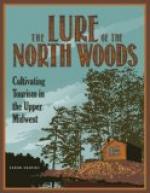“It’s easy to be superstitious here,” he resumed. “One feels that human power is limited and loses one’s confidence. I expect something of the kind accounts for Driscoll’s nervous fears. In the city, he would have no time to brood; he’d spend his days in a noisy workshop and his evenings in a crowded tenement or saloon. But if he’s scared of the dark and loneliness, why doesn’t he pull out?”
“Human nature’s stubborn. A man with a compelling object may be afraid and fight his fears.”
“I’d like to know what Driscoll’s object is. Since the night in his shack, when the fellow was sick, I’ve wondered why Strange’s canoe capsized. Strange was a clever voyageur; so’s Black Steve.”
Father Lucien looked at him curiously and there was a hint of shrinking in his eyes. “I cannot tell; perhaps we shall never know! But if there was foul play, what would Driscoll gain?”
“It’s hard to see,” Thirlwell agreed. “I could understand it if Steve had afterwards staked a claim, but nobody has found the ore yet. There’s another curious thing; I don’t see what he’d gain by leaving you to starve, as I think he meant to do.”
“No,” said Father Lucien sharply, “that is impossible! Besides, Driscoll was trapping some distance off.”
“A white man stood looking down at you and then stole away, although he saw you had no camp outfit,” Thirlwell insisted.
“He may have been short of food and came to borrow. Seeing I had none, he was perhaps afraid to share any he had left with me.”
Thirlwell shook his head. “I haven’t met a prospector who would let a white man starve; they’re a rough but generous lot. In fact, the only man I know who’s capable of the thing is Driscoll.”
Father Lucien did not answer and presently lay down, but Thirlwell sat for a time, thinking while he dried his moccasins. The missionary was something of an idealist, although he knew the weaknesses of human nature, but Thirlwell was practical. Somehow he had got entangled in the complications that sprang from Strange’s supposititious discovery of the ore, but he did not want to break loose. Agatha Strange needed him; she had admitted that there was nobody else to whom she could look for help and advice. So far, he could find no clue to the web of mystery that surrounded the matter and had caught them both, but he meant to search.
When the moccasins were dry, he began to wonder why he was anxious to help the girl, since he was not in love with her. In a sense, it was perhaps his duty, but this did not account for his keenness. He gave it up, and after throwing some branches on the fire lay down and went to sleep.
The fire was low and gave out no light when he wakened. He felt cold and remembered with some annoyance that he had not gathered enough wood to last until morning. He had not brought his watch, partly because he had fastened a small compass on the chain, but he knew that day would not break for some hours yet. The mist was thinner, although it had not gone, and looking up he guessed the moon’s height by the elusive glimmer in the haze. It was about four o’clock, and he imagined he had wakened when the heat of his body had sunk to its lowest; but was not altogether satisfied, since he had slept undisturbed by much keener frost.




